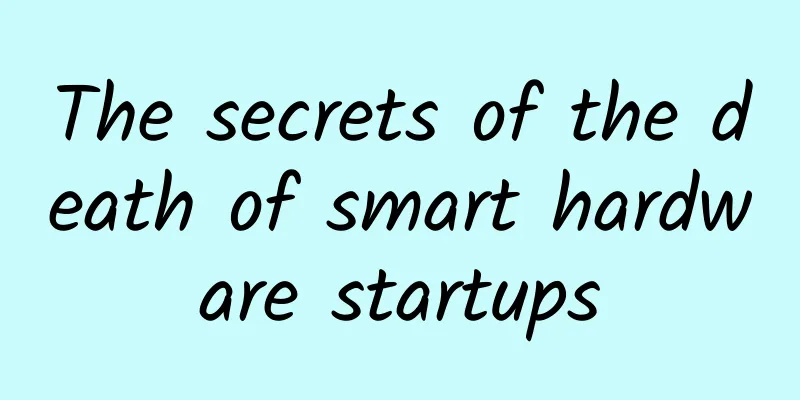The secrets of the death of smart hardware startups

|
This article is transferred from: Channel Help Shenzhen, which has a warm winter, started to rain heavily yesterday. Two days of winter rain have brought Shenzhen back to winter. The streets are full of bulky winter clothes, which seems to tell people that this winter will be particularly cold. For startups in the smart hardware field, it is difficult to start hibernation mode in this cold winter. As early as the beginning of this year, industry insiders predicted that 80% of smart hardware teams would die by the end of 2015. The reason is that most smart hardware companies are not profitable at present and survive by burning money. The investment tightened in the second half of 2015, making it difficult for them to get the next round of financing. For those companies without cash flow, once the money is burned and the cash flow is cut off, they will quickly die. In fact, not only hardware companies, but also the entire smart hardware industry chain, including technology platforms, incubation platforms, supply chains, channel sales, etc., have been affected to varying degrees, and the development is not very prosperous. As a veteran who has been working in the smart hardware industry for 20 years, the startup smart hardware company I served has just closed down. Recently, I have also visited many startup smart hardware companies and saw many smart hardware startups that are on the verge of death or struggling on the line of death. Based on my experience, I would like to summarize several ways these startup smart hardware companies die to warn other smart hardware startups. The reasons for the death of start-up smart hardware companies are nothing more than the following: 1. Working in isolation and not understanding market demand; Let's take a look at the surrounding smart hardware startups. When they were doing product project establishment and product planning, several of them did market research and market sampling. They were all started by a few co-founders. For example, Xiaoyu at Home, a product focusing on home video, is priced at 2,999 yuan. The slogan of this video device is "3 seconds to home", which has a high-end concept. The appearance design is also very rustic, just like the one made by the Shenzhen Shanzhai factory, a base plus a tablet, known as a family companion robot, isn't it used to video chat with family members, but dare to sell it so expensively, I just laugh at this. The author believes that Xiaoyu's products at home do not hit the pain points of users, and they are artificial "just needs". Apple's Facetime can completely replace Xiaoyu at home, and even QQ and WeChat video calls can meet this demand. It is said above that Xiaoyu's design is a bit of a copycat, which seems to be a bit exaggerated, but Xiaoyu's design at home really has no aesthetic appeal. The exposed large camera and the screen the size of an iPad mini, even the only technical feature - camera tracking, is the camera moving with the neck, which gives a feeling of the original version of the protagonist Wall-E in the movie "Wall·E". In fact, it is just an unsuccessful imitation of Jibo. As for technical innovation, I read the product introduction for a long time, but I didn't find it at all. It is precisely because of the closed-door pricing that is not in line with the market and out of the psychological price range for trying new things. Currently, smart hardware products have not been widely accepted by consumers due to immature technology and incomplete supporting facilities. It can only be said that it is still in the market cultivation stage. When evaluating the success of Xiaomi bracelets, technology commentators pointed out that it is because of its low price, which is suitable for consumers to buy one immediately to try new things, which can cause impulse purchases. When Xiaoyu entered the immature market with the gimmick of companion robots at 2299/2999 yuan, it was an overestimation of the market acceptance. Jibo's success abroad at 749 US dollars does not mean that Xiaoyu will achieve the same success at home. In fact, this is just an example. There are still many smart hardware startups in the market and many products that are developed behind closed doors and on the spur of the moment, such as smart rice cookers, music sofas, smart toilet lids, etc. There is no demand for many of these products in the market at all. 2. Idealism without considering the cost; Many smart hardware startups consider aesthetics or petty bourgeoisie sentiment when making products, but do not consider the cost in terms of product materials, accessories, packaging, etc. The cost of the products they make is much higher than the existing products on the market. How can such products be competitive? There is nothing wrong with pursuing product perfection, brand tonality, customer experience, and craftsmanship, but when pursuing these, should you think about where the market competitiveness of a startup brand without brand awareness lies? How do you sell the product after it is released? A startup boss told me that he had to increase the cost by more than ten yuan for a back cover process. I asked him why he wanted to increase the cost. The effect of the cost increase is not much different, and the market will not pay for it. Here I advise all startup bosses to be their own bosses and spend money wisely. 3. Lack of focus and too broad product line Many startups plan many categories of products at the beginning. For example, a company with only 50 people I have seen planned speakers, smart projectors, OTT boxes, bracelets, watches, body fat scales, smart routers, car air purifiers, etc. Several product managers were exhausted, and the R&D costs exceeded tens of millions, but in the end not a single product was successful. For a startup brand, remember not to extend the product line too long. You must focus on creating a hit product in one category, build a brand, and establish channels. Once you have the foundation of brand and channels, think about whether you have core technology. If you do, then consider entering new categories. A company's resources and funds are limited, and the cost of time can never be bought back once lost. When you haven't done well in one category and haven't built up a large volume, and then you move on to other categories, you will not be able to leave any memories or associations of your products and brands in the minds of consumers. Remember! Startup smart hardware companies must make breakthroughs in a single product category and establish their brand. 4. No financial plan, spending money recklessly; Many smart hardware startups become rich overnight after raising funds. The CEOs become arrogant and look for top design companies to buy IDs and 4A advertising companies to make plans. They don’t know whether they match the target customers and just invest in a round of advertising. They don’t even have a full-year financial plan. They spend the money they have first, and then consider raising funds when they are out of money. They don’t even consider saving food for the winter. If they can’t raise funds, they will have to close down. Even if they do raise funds, they will lose their controlling rights in the end, and even the founders themselves will be out. For example, after the B round of financing of a smart hardware startup I know, the CEO no longer has financial control, and funds above 5,000 yuan need to be approved by the financial director sent by the investor. There are also many smart hardware start-up companies that have not even hired a finance department. The finance department of a smart hardware company I visited was actually empty. Many entrepreneurs mentioned one thing in their summary after failure, that they regretted not hiring a finance department. Start-up companies can save on everything except finance. You must know that a part-time accounting agency can play no role in the company's operations. 5. The CEO makes decisions arbitrarily and without democracy As the chief executive officer of the company, the CEO should have the power to make decisions on major issues, but having the power to make decisions does not mean that In terms of product planning, technical research, and marketing promotion, we should listen more to the opinions of product, technology, marketing, design, sales and other related personnel, after all, they are the professionals in these fields. Once a smart hardware product is designed or produced, it will be difficult or impossible to change it back, especially for products with technical bugs, which will cause irreparable losses to the company. The CEO of a company I know once chose a touch remote control for its product when nine votes opposed it and he himself voted in favor. In the end, the market spoke louder than expected, and the product became unsalable because it attempted to change people's inherent usage habits. There is also a smart home company whose CEO always made his own decisions when planning projects. He changed three projects in three years and ended up losing 100 million yuan in three years. There are many such cases around us. CEOs are requested to listen to everyone's opinions when making decisions. Startups that do not work together and give full play to everyone's wisdom are likely to fall into a pit. 6. Just design without considering sales; Many smart hardware startups choose cost-effective materials and adopt screwless design for the sake of product beauty, under the pretext of learning from Apple. However, they do not know how domestic technology and production process can compare with Apple. The high cost of one-time appearance design increases sales costs and makes production difficult. Most importantly, it causes great difficulties for product after-sales service. Once the machine is disassembled, the shell will definitely be scrapped. Therefore, we hope that start-up smart hardware companies will consider costs and future repair issues more when designing. After all, we are not making fast-moving consumer goods or disposable products. 7. Failure to conduct scientific inventory management, resulting in inventory backlog or out of stock during peak season; Some start-up smart hardware companies do not have a scientific inventory management method. They place orders either conservatively or aggressively, which can easily lead to inventory backlogs or shortages during peak seasons. Smart hardware products are consumer electronic products that are updated very quickly. New technologies and new functions appear in just a few months. A scientific management tool is required for inventory management. Sales forecasts must be made from the moment an order is placed, and finished product inventory, in-transit orders, and orders not yet received on the production line must be classified and managed. In addition, the PMC and sales director must track orders and inventory in real time every week. Here, based on the author's many years of inventory management experience, it is recommended that start-up smart hardware companies make reasonable sales forecasts for products according to sales platforms, conduct dynamic inventory management on a weekly basis, and adopt a step-by-step ordering approach. 8. No brand building and no long-term brand investment; Xiaomi's Internet thinking has corrupted a large number of start-up smart hardware companies. They regard Lei Jun's Internet thinking as the "entrepreneurship bible" and think that they can immediately establish a brand by using Xiaomi's trick. They hope that they can also stand on the cusp of the trend and soar into the sky. However, they don't know that there is only one chance for the trend, and Xiaomi, the pig, is not having a good time now. Reality tells us that any Internet brand that neglects brand building is a castle in the air. Consumers can easily be attracted by the low prices of another brand and fall in love with it because of the buying and selling relationship established with low prices. Brand building is a long-term process and requires long-term planning. For start-up brands, without brand awareness and purchase recommendation rate, dealers will not have any sense of brand security. The brand is your own. If you don't invest, it is impossible to expect the dealer to invest for you. Therefore, start-up smart hardware companies must have a long-term brand planning and brand investment, and make necessary market investment first to enhance the sense of security of dealers, so that they will be willing to play with you, work together, and work together to make sales. 9. Only focus on online sales and ignore offline sales. As mentioned above, Xiaomi has corrupted many smart hardware startups. They think that if they sell well online, offline channels will naturally come to them, and they even think about scalpers. What's more, some people think that offline business is a very traditional way of playing, and even despise offline business, thinking that it is a low position for an Internet company to position itself as an offline business. History tells us that heroes are made by the times. Xiaomi was at the forefront of the smartphone boom at the time, and it succeeded, but it was only Xiaomi that succeeded. Which other mobile phone companies that learned from Xiaomi have succeeded? The answer is no! The cost of doing e-commerce according to conventional methods is very high. The cost of buying traffic is much higher than the cost of offline promotion, and the purchased traffic does not necessarily lead to sales. First of all, a startup smart hardware company needs to build an e-commerce team with operational experience and skills. It needs the luck and time cost to recruit truly talented e-commerce talents. In addition, after your product is launched, your competitors will have sales and reviews that are far ahead of you. Your product's default ranking and popularity ranking are already far weaker than others. This requires considerable operational skills and a lot of promotion costs to shorten the gap with others. To say that you can surpass others is basically a pipe dream. It is another matter if you are prepared to lose tens of thousands of units to build an online brand. In fact, the easiest way for a start-up smart hardware company to develop is through offline channels, because it is very easy to promote a regional brand or an industry brand through offline channels, and even the agent is a local brand. As long as the product has selling points and is of high quality, sales can be quickly generated by entering offline channels. 10. Shareholders split up and killed each other In the start-up phase, many start-ups have split up arbitrarily due to disagreements among shareholders. Teams that originally had complementary strengths suddenly became enemies, and they all made identical products in the market, poached each other, and undercut each other on price, but ultimately failed to make money and ended in failure. There are too many examples like this around us. Here I hope that the co-founders of startups can seek common ground while reserving differences when they have arguments or disagreements, stay true to their original aspirations, and work together to conquer the world! The difficulties encountered by one person in starting a business must be much greater than those encountered by several people starting a business together. 11. Quality is not up to standard, so the requirements are relaxed for shipment Many people will definitely laugh when I write this. If the quality is not up to standard, and you relax the requirements in order to ship, isn’t this suicide? But many startups are making this mistake. For example, the company I served had a lot of bugs in its products and a very poor experience. The CEO said that he wanted to seize the market during the peak season and placed a large order. In the end, the market returned a large number of products. It has been almost two years and there are still tens of millions of inventory in the warehouse. Many startups have bugs in their own products, but they don’t think about shipping after the problems are solved. They make excuses for themselves, saying that the peak season is coming, they want to seize the market, or customers are urging for delivery, etc. What the hell? The product is yours, the brand is yours, and people will definitely return the product to you if they find that the product has quality problems. 12. No profit model, relying on storytelling to deceive people Many smart hardware startups act on impulse and dive into the entrepreneurial army without figuring out their own profit model. When they have burned through their money, they go around telling VCs their stories. However, they don’t realize that in the capital winter, investment in the smart hardware industry is tightening, and they can only close down if they can’t survive. Smart hardware startups must figure out their own profit model. The era of telling investors that hardware is losing money to attract users is over. There is a saying that only when the tide recedes can you find out who has no clothes. The current investment environment is also the same. Only in the capital winter can you find out who has the ability to make profits. Starting a business is not easy, so cherish it while you do it! After all this talk, what kind of hardware companies can survive? In this chaotic hardware industry, products with false demands will definitely be eliminated, but how to make a good product and how to survive this cold winter are issues that many hardware companies need to consider. In terms of product direction, the author suggests two directions for start-up smart hardware companies. First, the intelligent upgrading of existing hardware products in mature markets. This is an inevitable process of evolution from ordinary products to smart products, and consumers can easily accept it. Second, innovative products with strong technology that did not exist before, such as drones, VR, etc. The author believes that start-up smart hardware companies must first think about surviving. The first type of smart hardware companies that are easy to survive are those that have strong technical barriers behind their hardware, and this technology also has industry solution value, such as drone gimbal technology, VR content conversion technology, etc.; the second type is smart hardware with large shipments, such as smart bracelets and watches. Whether it is through offline channels or e-commerce, as long as they can be sold, they can survive. The characteristics of smart hardware that can be shipped are very distinct, that is, the design and performance are mediocre, but the cost performance is super high, and the channel resources are strong. For start-up smart hardware companies, survival is the kingly way! With the entry of giants, smart hardware companies that can survive in the future will either have a strong technical foundation or be able to establish their own brands. In the field of smart hardware, there will be difficulties and setbacks of varying sizes in the three stages of production, sales, and user monetization. It is not easy to start a business in smart hardware, and many companies will die in the cold winter. Moreover, with the layout and entry of large companies, small companies will have fewer and fewer opportunities. But from the perspective of industry development, the prospects for smart hardware are very optimistic. After this wave of reshuffle, the surviving companies will thrive, and the disbanded teams can also start a second business. Next year's smart hardware will usher in a new wave of development climax. Finally, the author hopes that start-ups in the smart hardware industry can be well prepared for the winter, and even consider banding together for warmth. In this winter, they should carefully consider next year's strategy, abandon naivety and impetuousness, do a good job of market research, grasp the market pain points, and create products that will make the market scream, so that they can have a good harvest in 2016! As a winner of Toutiao's Qingyun Plan and Baijiahao's Bai+ Plan, the 2019 Baidu Digital Author of the Year, the Baijiahao's Most Popular Author in the Technology Field, the 2019 Sogou Technology and Culture Author, and the 2021 Baijiahao Quarterly Influential Creator, he has won many awards, including the 2013 Sohu Best Industry Media Person, the 2015 China New Media Entrepreneurship Competition Beijing Third Place, the 2015 Guangmang Experience Award, the 2015 China New Media Entrepreneurship Competition Finals Third Place, and the 2018 Baidu Dynamic Annual Powerful Celebrity. |
<<: Don't guess what users are thinking. This is the explosive temperament of smart devices.
>>: Is it possible for Netflix, which became famous due to "House of Cards", to enter China?
Recommend
Yi Zhongtian's Chinese History: The Great Song Dynasty Reform
Yi Zhongtian's Chinese History: The Reform of ...
3 wrong breakfast combinations, how long have you been eating like this?
For office workers and those who have trouble get...
Helicobacter pylori has these "effects"? Don't be complacent, you still have to treat it!
In 1982, Australian scientists Barry Marshall and...
We will tell you the secret behind the “exaggerated style” of mooncake packaging!
Mid-Autumn Festival is approaching, and it is tim...
Operational list for private domain traffic diversion on TikTok!
The article is short and only contains essential ...
Can WeChat mini programs be written in Python?
Q: Can WeChat mini programs be written in Python?...
WeChat Product Manager: Spring Festival Gala Shake Project Experience Summary (Product Edition)
[[128420]] I was fortunate to participate in the ...
Complete information flow promotion plan for 5 major industries! Take it for reference~~
Nowadays, mobile advertising is experiencing expl...
Zero-cost practical project for novices to make money, you can earn more than 200 yuan a day
Zero-cost practical project for novices to make m...
Your power bank may be secretly filming? Shared power banks are not as safe as you think...
Editor: Gong Zixin In recent years, there have be...
Astronauts are not allowed to fart. How can they do this?
The environment in space is completely different ...
Android: An efficient UI is a cool UI (Part 1)
Introduction Android is an operating system that ...
The legendary terminator of plastic pollution may cause more serious pollution
As global demand for plastics continues to surge,...
Fun fact: Is it possible for humans to grow wings?
I have nothing to do today, so I want to talk to ...
How to write a product promotion plan?
Entering 2018, major companies have begun to form...









